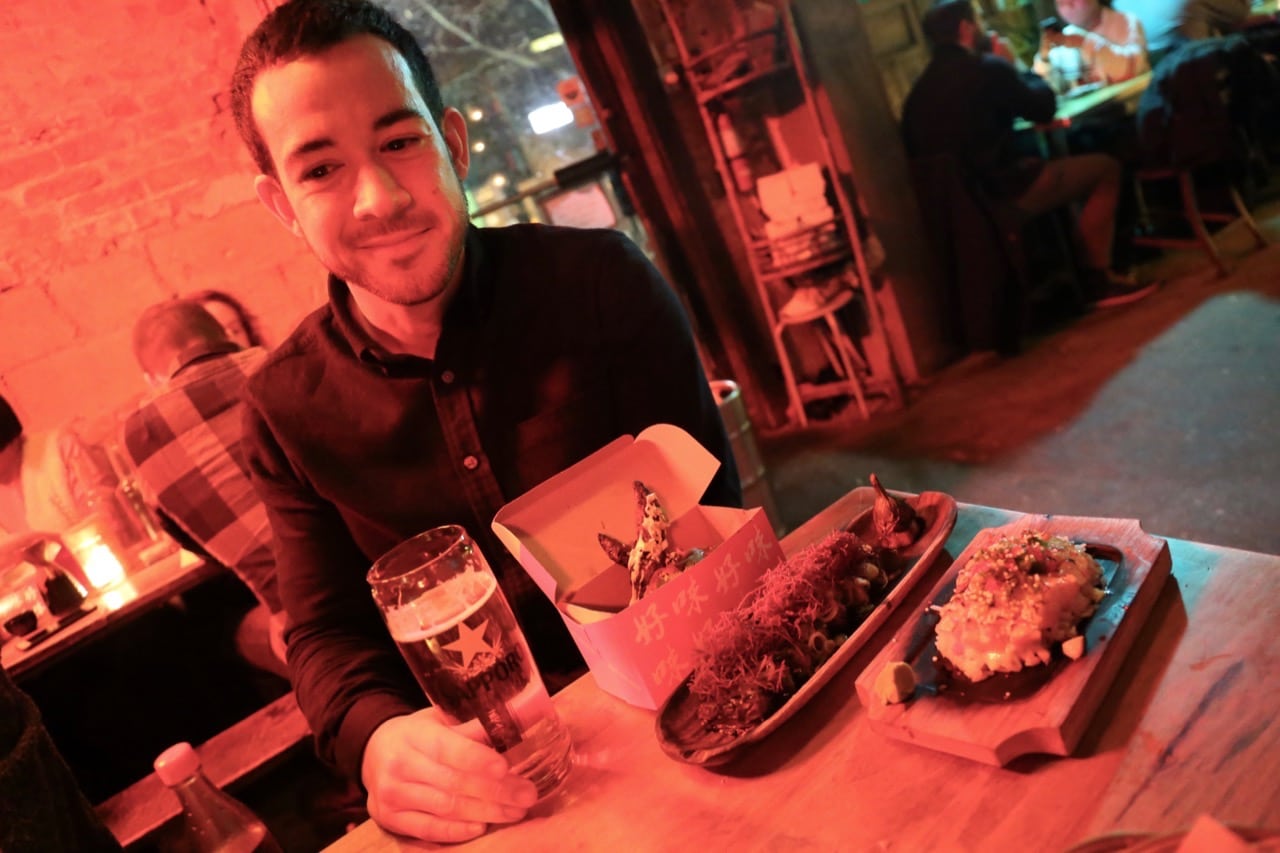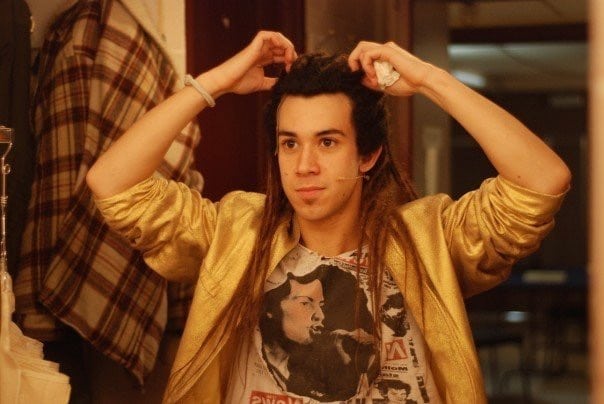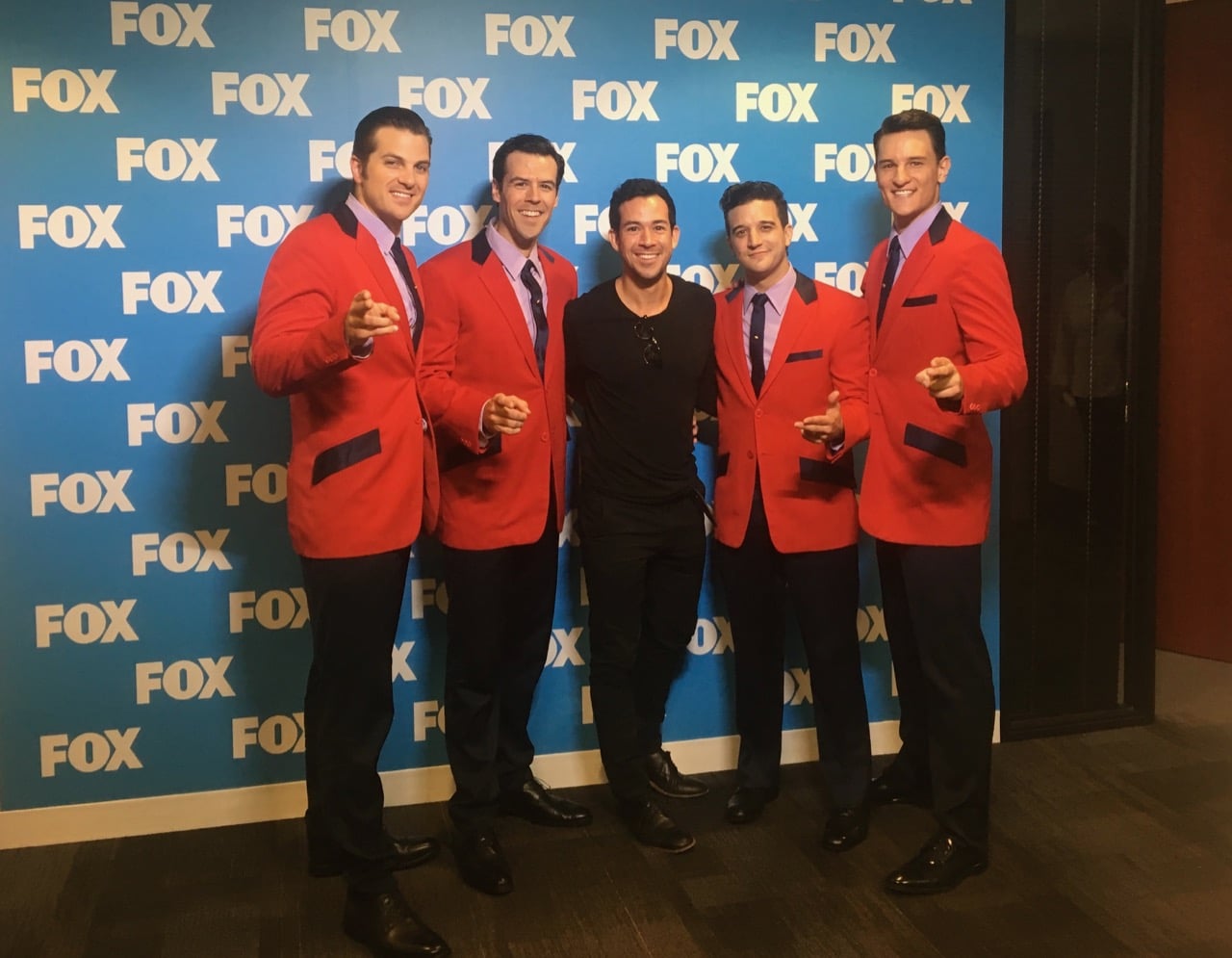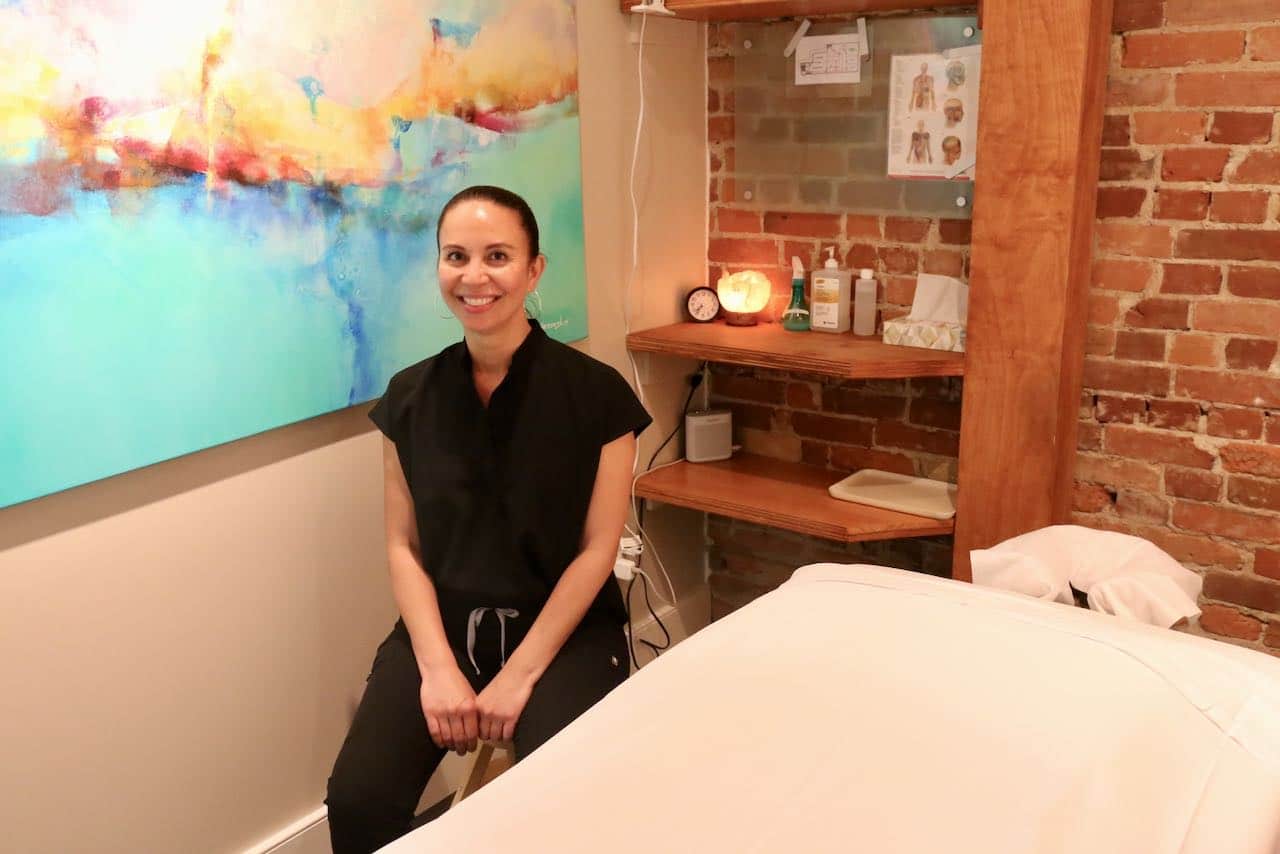We both sat shivering in the petite dining room at Hanmoto. Toronto’s popular Japanese izakaya sits perched over Dundas Street West near Dovercourt Road, a trendy stretch of the city’s west end hipster hood. The atmospheric interior is decked out in flea market decor and soaks in a warm rouge glow.
Toronto-based performance artist Bryan Hindle sat across the table from me, sipping a pétillant pint of Sapporo while wagging his finger down Hanmoto’s menu. We spent the next two hours lip smackin on finger licking good dishes doused in ponzu and topped with the ecstatic dance of bustling bonito.
During dinner the celebrated Canadian queer performer opened up about his artistic journey: finding a fascination for the stage at Toronto’s Wexford School for the Arts, dancing around the world with Nelly Furtado, and honing his musical theatre chops in shows like War Horse, We Will Rock You and Dirty Dancing.
While Hindle is nostalgic for his past, he’s most enthusiastic to inspire others by sharing the unique journey of his career as a singing and dancing man about town.

When did you first realize you had a knack for entertaining?
I have always been described as “animated.” I was never sure if that was a compliment or just a comment on my cartoon-like features (big ears, wide eyes), but I went with it. My parents encouraged me at a young age to be vocal; to ask the Swiss Chalet waiter for a Shirley Temple refill myself and not rely upon them to do it for me; to express freely my love for the New Kids On The Block by screaming as loudly as my sister at our first concert.
I think this is what allowed me to step up on stage when I was encouraged by my fourth grade teacher to take on the role of a chubby, gay Willy Wonka in our school’s annual production, to take part in SPEECH ARTS (an event where kids performed poetry or addressed an audience with original material), and to raise my hand when the choir conductor asked who wanted to audition for the solo.
Though I was evolving into an outspoken performer type, I’m not sure I even considered the entertainment industry professionally until High School. I had the most creative, supportive, and encouraging teacher (Mrs. Janice Griffin of Morrish Public School) who pushed me to audition for Wexford School for the Arts. It was not until I was accepted and well into my first year that my bleached-out undercut-sporting, rainbow and sparkle-wearing self knew that I was actually moving towards a career in entertainment. I suppose it’s one of those things you always know, but never really address. I guess I still don’t. Despite my career, I still just feel animated.

How did theatre and arts school prepare you for your career as a professional artist?
I remember showing up at Wexford for my audition. If I got in, I’d have to take the bus for an hour to high school every day, I’d work long into the evening and sometimes on weekends, and I would be required to maintain a solid average in my regular academic credits. But first, I had to simply sing a song without barfing in front of a panel of teachers and honoured students. They seemed pleased, so I started to pack up to meet my Dad in the parking lot. Someone then announced that we’d be doing the dance audition in a few moments, and I recall my heart stopping. I was shaking in my ill-fitted jeans and my construction boots (all the rage at the time) as I walked into the dance studio fully unprepared to dance. I had never danced. But I danced.
Wexford School for the Arts was 1/3 Musical Theatre students, 1/3 Visual Arts students, and 1/3 local students who were irritated by the other 2/3. The training was intense, the teachers were intense, and my interest in refining my skills grew to be rather intense. Ann Merriam, the extraordinary Program Director taught me to “leave it at the door,” which meant to walk in to the rehearsal room ready to work, and Honey Frid, our creative and inspiring Head of Dance taught me that I could dance.
I never imagined that I would go on to dance internationally with Nelly Furtado, or that I’d become a Dance Captain, Assistant Choreographer, and Associate Choreographer for Jersey Boys representing Broadway’s Sergio Trujillo. While I had some formative experiences later at Sheridan College for theatre and McGill for opera, I really attribute most of my training to the professional program at Wexford. They have produced some of Canada’s most successful actors, and I encourage any young performer to seek it out and audition.
What have been the hurdles and blessings of being a gay actor on stage today?
I can’t say that I have a difficult “coming out” story. I was encouraged to early on, was surrounded by supportive friends and family, and had a crush on Mark Wahlberg that I just couldn’t hide. Unfortunately, that left me a bit impatient with others who choose to keep quiet in fear that they’ll be pigeonholed. What I must understand is that their fears aren’t unfounded. I would like to say that the theatre community is beyond homophobia, but that would be naive. I find it most demoralizing when you see a guy who’s been muted by it. Perhaps he was told he “sounded gay” or that his movement was “too gay.” Marginalized groups have the experience of being told how to act or assimilate in any setting, or in contrast to “act more gay” or “more black” for parts that aren’t written with a great deal of nuance. Either way, we’re forced to look at ourselves through that lens and some gay men begin to edit themselves, avoid certain words, pitch their voices lower. It’s heartbreaking to watch.
What makes me hopeful is that we are beginning (and I do mean beginning) to see more stories that are told from the perspective of LGBTQ people. I hope we’re moving away from the tendency to make our gay characters, for instance, more palatable by amplifying stereotypes, but I’m also happy to celebrate some of those stereotypes. I’m proud to exhibit some of those qualities in my everyday life. I’m gay and people know. I think that being proudly gay, whatever that looks or sounds like, is the next step. And then hopefully we’ll see a time when it’s no more than a small detail in an otherwise thrilling tale about – I don’t know – my relationship with my Chinese-Jamaican grandmother.
You toured with Nelly Furtado as a dancer. How was that work unique to the musicals you’ve worked on previously?
I hadn’t been out of school for very long, and still didn’t really think of myself as much more than a “spirited mover” when I was asked to dance for Nelly at the MTV Latinoamerica Awards in Mexico City. But I try not to shy away from a challenge or unfamiliar experience, so I very excitedly accepted and joined the team of four dancers, a group of brilliant musicians, and Ms. Nelly Furtado for this awards show adventure.
That turned into an offer for a US promotional tour where I danced at stadiums like Madison Square Garden with some pretty killer artists like Justin Timberlake, Timbaland and Shakira, then the Grey Cup halftime show, and ultimately at a massive New Year’s concert sponsored by NOKIA in Mumbai. It was a bit of a whirlwind. It was very intense and demanding. There were certainly aspects that I loved – the rush of 80,000 fans going wild in front of you, bouncing that energy back and forth.
I remember telling Nelly at that New Year’s after party that I was hugely thankful for the experience, would gladly join her again one day, but that I needed to accept a theatre contract that I’d just been offered with Mirvish Productions in Toronto. She’s so incredibly generous and down to earth that she tried to convince me to stay saying that if I wanted to do more than dance, I could join her backup vocalist, Devine Brown, and continue as a singer. I explained to her, realizing it for myself as I spoke, that I felt at home in theatre, that I’d always trained for it and loved it, and that I needed to take this opportunity. The woman flew me home First Class and I immediately second guessed my insane choice!
But as I stepped into the rehearsal room for We Will Rock You and sang the thrilling music of one of my favourite bands of all time, QUEEN, with some of Toronto’s finest theatre performers, it all just kind of made sense. It was intimate and playful. I was able to apply my skills, but also be my foolish self. That contract led to Dirty Dancing which lead to Jersey Boys and then War Horse and then back to touring the US with Jersey Boys. While I will never limit myself or turn down an exciting opportunity and have worked in film, television, music, composition, voice-overs, commercials, I believe that I’ll always come back to theatre so that I can act a fool backstage, and then really know that I’m engaging my intimate audience when my cue comes.
What lessons have you learned from traveling around the world as an artist?
I think that many of the world’s problems stem from a lack of exposure to other peoples’ perspectives. If we only surround ourselves with like-minded people – people who look like us, who grew up in the same culture, people of the same economic status – we don’t learn empathy. If you look at politics geographically across America for example, the socially progressive tend to live in larger cities and I strongly believe that it’s the exposure to a broader representation of types of people. All that is to say, I grow more and more as a person with each destination my work takes me to. I have dismantled some deeply ingrained notions that I held to, and all it took was seeing or hearing about someone else’s experience.
I can’t count how many people told me to “be careful in Mexico” while I was traveling through small fishing villages. Yes, I will always have my wits about me, but I think we’ve all heard that so much that we have let it translate to a level of racism towards Mexican people. Morocco was a place to never show that you’re gay. But my sweet new friend from the small Moroccan town of Taroudant made it very clear that, while he was lonely as all hell in his small town, he had never feared for his safety. Why did I think that no one in Tel Aviv would eat bacon!? Was everyone there particularly religious in my mind? I certainly had some misconceptions about the American south, about Californians, about Tokyo and Japanese culture. I didn’t think that Chicago’s gay scene suffered from racial segregation. But then I went there! I didn’t think that Germans had a sense of humour. But then I went there!
My take away from all of this is that I really need to take a look at what I think is the truth, pull it apart, see where I got the notion, and then go find the truth through experience and conversation. Gain some perspective.
What is one aspect of your work that is challenging that people outside of the biz don’t understand?
Being away from home for even a couple of months would be tough for most people, I think. Being away from home for years on end makes you feel like you no longer have a home. Earlier in my career, I was lucky enough to book a series of great contracts right in my home town of Toronto. I bought a condo, dated some nice guys, had my closest friend down the street, and saw my family pretty regularly. I’m not sure that even I understood the reality of what a commitment to this field meant.
I then toured for 5 years. While the opportunity was career-defining, and the money was great, it truly left me feeling like I don’t know where my home is anymore. I was only gone for 5 years – I have many friends who have toured for 10 and 15 year, some for their entire careers. There’s an unsettled feeling that it leaves you with, like you can never fully unpack your bags, or you just need to decide where to “visit” next. It’s not a feeling that I think translates well when I talk about it. Most people think that it’s exciting to be in a different city every few weeks, family members assume it’s a constant party, but it’s a pretty lonely life. There’s a moment in the script of Jersey Boys where Frankie Valli is with Bob Gaudio at a diner while on tour – somewhere – and he says: “I wake up in the middle of the night, I don’t know where I am. I think, ‘what the hell happened?’ ‘What’s gonna happen?’”
That resonated with me more and more each year away from “home.”

You are now overseeing Jersey Boys as the Associate Choreographer for Norwegian Cruise Line. Does performing at sea offer any unique challenges?
My long-time colleague and mentor, Mr. Danny Austin and I had just finished rehearsals for the first cast of Jersey Boys for NCL. While the cast got some time off to collect their lives before they went off to sea for six months, Danny and I flew to meet the ship where it was still being built in a small town called Eemshaven in the Netherlands, a few hours outside of Amsterdam. Our job was to “dry-tech” the show which is to run all of the technical aspects of the show (lighting, automation, projections etc.) without any live action on stage.
We arrive the first day to this stunning new Norwegian Cruise Line ship called the BLISS which features go karts, laser tag, a water park, a casino and more all on 20 storeys of excitement and we soon realize that, unlike in a theatre on land where the focus is all on the show being mounted, we are among nearly two thousand contractors trying to board the ship to do their job that day. I think it’s a rude awakening for any theatre person not to be the centre of attention – but I digress.
When we finally board this unfinished ship (which is currently floating somewhere on the Panama Canal, completed and gorgeous), we get right to work. That’s when the fun began. I, not having ever been on a ship before, realize almost as soon as we set sail for “sea trials” that I do indeed get some motion sickness. Note that this is on the North Sea, a choppy territory that cruise ships don’t often venture when in regular operation.
Danny’s in the audience, I’m standing on stage and we’re focusing lights which means I have to stand still facing downstage while someone lights me for hours and hours. I’m teetering back and forth trying to hold down my crew-mess buffet lunch, and we all look up when we hear a mic stand fall over and hit the stage. I then fall over and hit the stage, and then every set piece that is on wheels – which is every set piece in Jersey Boys – comes pouring out from stage left and directly towards me. We’re talking guitar racks, tables, a small couch, and a piano all headed directly for me. We all go running to catch them before they hit our automation or our light wall and suddenly this entire 20 storey ship lists the other way and everything starts to slide back into the stage left wing. We learned that day that, yes, performing at sea offers some unique challenges. We bought straps on our next trip into Amsterdam.
Now that you are a seasoned entertainer how do you see your career evolving into the future?
Seasoned. I like that. I’ll take it! I feel old, but I’ll take it.
Perhaps it’s not the student talk-back answer, or the interview-for-publication response, but I got into this field without a definite plan. I know a lot of artists who gave themselves goals, “be on Broadway by 30,” “win a TONY by 40.” I can’t say that I don’t have my stresses, but for the most part I enjoy not knowing what’s coming next. My friends will scoff at that having just heard me scream-cry “WHAT’S COMING NEXT?!” at them all week.
Perhaps, I’ll develop a more concrete idea of where I should be and at what point in my life I need to be there, but a part of what drew me to this industry was that there isn’t one set path to success. There isn’t even one set bench mark of success. I suppose that if one can support himself, travel the world, balance his work with his personal life, take part in building creative works, and establish lasting friendships and relationships, he’s been pretty successful. Do I intend to Choreograph and Direct? Absolutely. Will I write and workshop original works? Yes, sir. Will I ever be done performing? Definitely not. If it’s chronic dissatisfaction that keeps me moving, then so be it. If it’s the pursuit of something that’s unattainable or doesn’t even exist, I’ll still pursue it. But if my drive can be fuelled by the love of this industry and the people in it, or the foolishness that happens backstage, or the moments I shock myself onstage with some truth, I think I’ll always feel as successful as I do today.
The only goal I have ever had is to keep moving forward. And I will.



